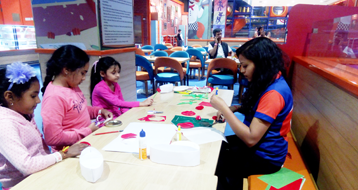
Brain training games are advertised to schools with the promise that they will improve students’ learning. What are these games, and can brain training really boost outcomes? The latest scientific research indicates that it’s crucial to train the skill within the correct context.
The idea that children’s brains can be trained through simple games that either optimise the brain for learning or teach the important skills for learning is appealing. Like neuromyths, many brain training programmes are based on a kernel of truth about the brain. But this kernel of truth is often applied inappropriately to a computer game and taken to the classroom before evidence of its effectiveness exists.
It is true that PLAY and GAMES can “train your brain”. This is because the brain is constantly changing and learning based on the environment. Brain training programmes typically present children with memory games, logic puzzles, or even just games that require a fast reaction. These programmes are likely to be fun, and repeated practice means that children can improve over time. But we must be careful. If a child improves on a “logic game” over a few weeks of playing it, does this really mean that their logic skills have improved? Improving on a selection of specific games does not mean that the skill itself has been improved in any meaningful way.
“Improving on a selection of specific games does not mean that the skill itself has been improved in any meaningful way.”
Well-meaning websites and blogs from educators describe the cognitive functions that these games aim to train. Examples include self-control, attention, working memory (the ability to hold information in mind and manipulate it), and creativity. But do they really train these abilities? Rather than simply looking at whether children get better at the games, we should be asking whether or not using these games has any positive impact on learning. Do they actually do what they claim?
In most cases, the research simply hasn’t been done. With no scientific evidence to back up their claims, some companies sell their products to schools based on testimonies alone, giving the false impression that a product will produce certain positive effects. Where the research has been done, findings are not as encouraging as the companies suggest.
“With no scientific evidence to back up their claims, some companies sell their products to schools based on testimonies alone, giving the false impression that a product will produce certain positive effects.”
While performance on the game itself does indeed improve, this does not typically transfer very far. Some games may show some degree of near transfer, where there is improvement on tasks very similar to the game the child has practised. But the research shows very little, if any, far transfer, to performance on any school-related outcomes, which is where we really want to see the benefit.
Scientists are developing programmes that similarly aim to improve learning through repeated use of a certain cognitive skill. After all, there is clearly appetite for these games from teachers, children, and parents who may want their children to have a fun learning activity they can do at home.
But what’s different about these programmes is that they are being very carefully designed and tested to find out how to make sure they impact on important school-related abilities. What is clear from the research so far is that training a skill in isolation, such as working memory, is very unlikely to lead to improved working memory in a classroom setting. Therefore, to be effective, a game must go beyond this simple approach.
The approach currently being trialled by researchers is to train the skill in the correct context. For instance, if we want to improve working memory in science, we should train working memory in science (rather than in an abstract working memory game). This kind of research requires an interdisciplinary team of experts in order to bring all the relevant skills together, and will typically involve science teachers, memory researchers, and computer programmers. This multidiscipline approach, requiring communication between different parties, is one of the cornerstones of educational neuroscience.
“What is clear from the research so far is that training a skill in isolation, such as working memory, is very unlikely to lead to improved working memory in a classroom setting.”
It is still very early days in terms of finding out how best to “train” children’s brains. Many questions remain, for instance how many minutes a day children should spend on a training game, and how many days a week. Do any positive impacts last, or are they just a temporary boost?
The important thing to remember is that children’s brains are already changing constantly when they are in (and out of) the classroom. Any successful scientifically-tested games that are developed in the future are likely to form just one very small part of learning at school. And don’t forget that brain training is already happening in every classroom, in every school, every day; that’s what schools are for!